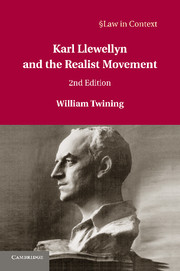Book contents
- Frontmatter
- Contents
- Foreword
- Preface
- Postscript
- Acknowledgements
- Abbreviations
- Part I The Rise of the Realist Movement 1870–1931
- Part II The Life and Work of Karl Llewellyn: A Case Study
- Part III Conclusion
- Appendices
- Appendices A The War Adventure
- Appendices B A Restatement of Llewellyn's Theory of Rules
- Appendices C Extracts from Law in Our Society
- Appendices D Llewellyn's Later Interpretations of Realism
- Appendices E Two Documents on the Uniform Commercial Code
- Appendices F The Pueblo Codes
- Bibliography
- General Index
Appendices E - Two Documents on the Uniform Commercial Code
from Appendices
Published online by Cambridge University Press: 05 December 2012
- Frontmatter
- Contents
- Foreword
- Preface
- Postscript
- Acknowledgements
- Abbreviations
- Part I The Rise of the Realist Movement 1870–1931
- Part II The Life and Work of Karl Llewellyn: A Case Study
- Part III Conclusion
- Appendices
- Appendices A The War Adventure
- Appendices B A Restatement of Llewellyn's Theory of Rules
- Appendices C Extracts from Law in Our Society
- Appendices D Llewellyn's Later Interpretations of Realism
- Appendices E Two Documents on the Uniform Commercial Code
- Appendices F The Pueblo Codes
- Bibliography
- General Index
Summary
THE KEYNOTE MEMORANDUM
From the mass of memoranda, letters, notes, articles and transcripts in which Llewellyn's thoughts on the Code are to be found, two documents stand out as having special significance: his general statement to the NYLRC in 1954, which is reproduced in full in the second part of this appendix. This is Llewellyn's most coherent apologia for the Code, but it must, of course, be taken for what it is – a powerful piece of advocacy. The other document, which is presented here, is less polished and more fragmentary, but is probably the most important single statement of the operative ideas of the Chief Reporter. This is a memorandum drafted by Llewellyn and addressed to the Executive Committee on Scope and Program of the NCC Section of Uniform Commercial Acts. Headed ‘Re : Possible Uniform Commercial Code’ it is undated, but was probably written in 1940, and circulated to the committee before Schnader's Presidential Address to the conference in September.
The Reasons for a Uniform Commercial Code
A Commercial Code, if successfully prepared, and if accompanied by an adequate exposition of its reasons, its policies, and of the way its parts fit together, has important values.
There is a very considerable body of commercial law which is very largely non-political in character, and which can be put into shape to be flexibly permanent. It affords, for use, a wide basis of case-law, and in many parts, a wide basis of good statutory material, together with experience under various Uniform Commercial Acts; also a wide basis of established commercial experience.
- Type
- Chapter
- Information
- Karl Llewellyn and the Realist Movement , pp. 580 - 601Publisher: Cambridge University PressPrint publication year: 2012



